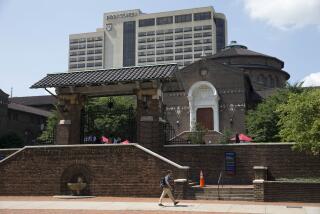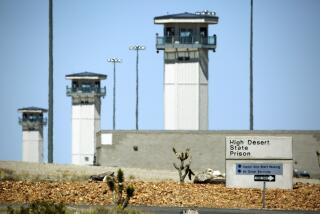Interns Learn If Death Becomes Them
- Share via
PITTSBURGH — As she picked up the corpse of a 2-month-old, Mary Labas learned on the second day of her coroner’s internship that death still had the power to intimidate her.
“I did not want to put this child down. I did not want to part with her,” said Labas, 32. “Just holding her little head in my hand, I’m thinking, ‘Oh, man.’ ”
As do most interns, students in the Allegheny County coroner’s office work long hours for no pay. Unlike most interns, they aren’t filing paperwork or answering phones--they’re sawing skulls, going to death scenes and dirtying their hands with the unsavory business of untimely death.
“We screen them, we talk to them first, show them what they’re getting into,” Deputy Coroner Jim Bentz said. “Most of the ones we’ve gotten have been kind of schooled.”
The majority are undergraduates majoring in science or criminology. They begin by going to death scenes with investigators; later, some move on to the autopsy room.
“Days I don’t even have to be here, I come in,” said Michelle Hoffman, 22, who described the county’s flamboyant, often-controversial coroner, Dr. Cyril Wecht, as her idol.
Hoffman, a suburban Philadelphia native and senior microbiology major at the University of Pittsburgh, recently graduated to the autopsy room.
Early on in her undergraduate career, Hoffman, a devotee of author Patricia Cornwell’s mysteries about a crime-solving coroner, wanted to be a pediatrician. Now she hopes to get a graduate degree in forensic science.
She speaks matter-of-factly about removing brains during an autopsy, about holding a human heart in her hands, about the curious smells of death.
“You look in the textbooks and see anatomy, and it’s all so clean and pretty,” she said, laughing. “But the first time I saw a pancreas, it just looked like a blob of nothing.”
The distasteful nature of dealing with death has led to a national shortage of forensic pathologists, according to Dr. Michael Graham, secretary-treasurer of the National Assn. of Medical Examiners.
“A lot of people don’t go into medicine to deal with dead folks,” said Graham, who also is the St. Louis medical examiner.
Even those willing to work as pathologists could make more money and avoid constant public scrutiny by entering private practice, he said.
Other coroner’s offices are stricter with their interns than the Pittsburgh office and severely curtail their access to bodies.
Dr. Christopher Rogers, who oversees interns for the Los Angeles County coroner’s office, said he occasionally uses medical students. But most interns already have graduated from medical school and are working as residents before he gets them for a monthlong program. “Most of what they do is, they will come and observe the cases,” he said.
In St. Louis, Graham said, medical students often sit in on autopsies, but they only assist if they have graduated.
Scott Carrier, a spokesman for the Los Angeles County coroner, said most students come only to decide whether they want to pursue a career in forensics, which he described as “very humdrum.”
“It’s kind of like do you want to be a brain surgeon or do you want to be a proctologist?” Carrier said. “There is something mysterious about the people that work around a morgue. They are an interesting lot. Generally, it’s a thankless job.”
Labas began working as an Allegheny County coroner’s intern after spending a year learning to be a funeral director at the Pittsburgh Institute of Mortuary Science. She said about one in every 10 people is curious about her job.
During the harrowing day she spent with the dead infant, she said, she took comfort in the fact that she had accompanied the child when the baby’s mother could not.
“Even though the mother doesn’t know it, the child’s not alone,” Labas said. “Being a woman, that would just crush me, thinking that my child was alone and cold and nobody was there to protect her.”
More to Read
Sign up for Essential California
The most important California stories and recommendations in your inbox every morning.
You may occasionally receive promotional content from the Los Angeles Times.













